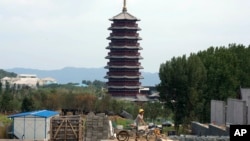China hosts top-level meetings of the Asian Pacific Economic Cooperation or APEC for the first time this November. The meetings follow months of Chinese territorial assertiveness in the region, which has created unease among some of its neighbors. It is unclear just how much can be done to smooth over ties before the meetings begin.
Analysts say China’s ties with Japan and Vietnam are Beijing’s biggest challenges in the region.
Japan’s prime minister has yet to meet with his Chinese counterpart since taking office nearly two years ago. Ties between China and Vietnam are also strained over a territorial dispute in the South China Sea that began heating up earlier this year.
Joseph Cheng, a political scientist at the City University of Hong Kong, says China’s hosting of the APEC meetings for the first time is both a challenge and an opportunity.
“This is an opportunity because as the host nation it enjoys certain benefits in explaining its positions and this is certainly an opportunity for public diplomacy," he said. "Trying to convince the participants as well as the international community [of] China’s peaceful intentions.”
Oil platform dispute
China’s decision to park a massive oil platform off Vietnam’s coast in the South China Sea triggered an angry backlash. Vietnamese protestors lashed out, targeting Chinese businesses and workers. At least four people were killed during the violence and nearly 100 injured. Several thousand Chinese workers left the country in the wake of the attacks.
"China hopes that during its hosting of the APEC meeting that relations will see improvement and that will contribute to the smoothness of the meetings," said Jin Canrong, a political scientist at China’s Renmin University. He says that while “relations with a few countries such as Japan, the Philippines and Vietnam are slightly strained, China’s ties with most countries in the region are still good.”
Japan
According to media reports this week, President Xi Jinping plans to send an emissary to Japan in the coming weeks to help boost ties ahead of the APEC meetings. The emissary, Li Xiaolin, is the daughter of former Chinese leader Li Xiannian and someone who reportedly has close ties to Xi.
Earlier this month, there were also reports that Japan and China were seeking to arrange a meeting between their two leaders during the upcoming APEC summit, which focuses on promoting free trade and economic cooperation.
Hong Kong City University’s Joseph Cheng says that while China has been refusing high-level talks for quite some time now, leaders in Beijing recognize that at some point, they need to have contacts with Japan.
“It is almost impossible simply to terminate contacts at the high level. At the same time they want to ensure that the initiation of these contacts will also bring some concessions on the part of the Japanese,” he said.
Renmin University’s Jin Canrong says it would be a positive sign if Chinese President Xi Jinping and Japanese Prime Minister Shinzo Abe have a chance to meet on the sidelines of APEC. But such a meeting is not critical.
Jin says that “even if there is not some improvement in ties with Japan or the countries do not get to meet it will not have an impact on the quality of the meetings.”
Jin adds that Japan aside, “one thing that is certain is that the leaders of two big countries, the United States and Russia will attend” APEC.
Vietnam
In addition to Beijing’s efforts to boost ties with Japan. It is also seeing some progress with Vietnam.
China’s Foreign Ministry announced this week that Vietnam will compensate the victims of anti-China protests that took place there in May. Hanoi is also sending missions to China to meet with the families of the victims of the violent unrest, according to a statement from China’s Foreign Ministry.
A senior envoy from Vietnam is in Beijing this week and wrapped up a two-day visit Wednesday. During his stopover the envoy met with President Xi and ranking Chinese Communist Party official Liu Yunshan. According to the state-run Xinhua news agency, Xi urged Vietnam to make "correct political decisions at critical moments," and work together with China to put the relationship back on the right track.





